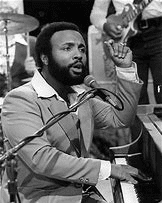Gospel is a genre of music used to say the words of Jesus and tell stories of his goodness. When African Americans were told about Christianity and converted in slavery, they began to use this message of Jesus and sing songs in their daily lives to communicate and praise the Lord in their troubles. African American gospel has shifted from negro spirituals, traditional Gospel, contemporary Gospel, and urban contemporary. The very same slave songs that we use as hymns have evolved in churches today. From the 1800s to the 20th century, Gospel has changed over time to different rhythms and styles that have brought many elements to gospel music. Using the old style of gospel music, we can study how Andrae Crouch has changed his music style to create this period of the 1970s to 1980s contemporary Gospel.
1900s
1920s
1940s
1960s
Traditional Gospel (Age of Different Voices)
A new style of Gospel developed in the 1900s-1960s. Traditional Gospel is defined as music written to express a communal belief or personal belief. As we listened to music from the 1900s to 1960, we noticed a shift or change in gospel music over time. The traditional Gospel is where solos, choirs, groups, and quartets create a new harmony. It starts at a slower pace with vocals, and as time progresses, we notice the tempo begins to speed up, and there is an incorporation of instruments with the music.
1970s -1980s Contemporary Gospel
There is a shift in the music from Traditional Gospel to Contemporary Gospel. Contemporary Gospel music provides happy, soulful, beautiful harmonies that are lyric songs that capture the audience’s emotions. Artists such as Andrea Crouch, Edwin Hawkins, Walter Walkins, and Clark Sisters created this new type of music that spoke about different elements of emotions. Compared to the Negro Spirituals, this style of music began to form songs that weren’t about slavery but spoke about moving past the hardships and living right in Jesus.
Andrae Crouch "The Father of Contemporary Gospel"
Andrea Crouch was born in 1942, in the traditional music era. Andrae Crouch is known as “The Father of Contemporary Gospel because he incorporated secular music styles into the traditional gospel he grew up listening to. Andrea Crouch records, Soon and Very Soon(1975) and Take Back(1975) were staples in the 1970s -1980s. “In Soon and Very Soon” and “Take Me Back,” you hear a jazz flow which was considered “secular music” and a mixture of traditional gospel music. He brought together Americans, creating styles of music for both the black and white Christians. In his audience, you can see the mixture of people in the crowd worshiping. Much music has been rerecorded by black artists and white artists such as Elvis Presley. Andrea Crouch was one of the most prominent artists in the 1970s-1980s that influenced many artists after his time. Andrae Crouch helped pave the way for the introduction of the Urban Contemporary Gospel in the 1980s through the 20th century.


